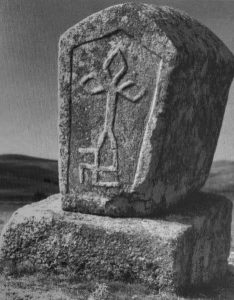The following essay originally appeared in the January 1992 issue of George P. Dietz’s Liberty Bell magazine, and is reprinted from the Revilo P. Oliver online archive. (more…)
Tag: Aryans
-
Congratulations, folks. We are about a week into our second White Boy Summer and already things are, as the kids like to say, popping. Roe v. Wade has been overturned, hoes are mad, and we still have most of the summer ahead of us. I write these words and a pleasant laziness permeates my body, calling me to the inactivity of the shade and the self-satisfaction of summertime repose. (more…)
-
September 18, 2018 Julius Evola
The Swastika
Various authors have written about the symbol that the new Germany has made into its emblem. We take up the subject here only to treat it from a special point of view, essentially considering the primordial traditions and the universal higher meanings potentially contained in that symbol.
First of all, where does the swastika come from? (more…)
-
November 29, 2015 Julius Evola
El Problema Judío en el Mundo Espiritual
English version here
En Italia no es muy sentido el problema judío a diferencia en cambio de lo que sucede en otros países, sobre todo en Alemania, en donde el mismo hoy, tal como todos saben, suscita profundas antítesis no sólo a nivel ideal, sino también en la esfera social y política. Las últimas leyes recientemente sancionadas, inspiradas en Göring, según las cuales en Alemania no sólo los matrimonios mixtos, sino aún la misma convivencia entre judíos y no judíos es prohibida y los judíos (more…)
-
Spanish translation here
In Italy, the Jewish question is not very keenly felt, unlike in other countries, in Germany in particular. There, as everyone knows, this question provokes deep tensions today not only on the plane of ideas, but also in society and politics. The most recent legislation, proposed by Göring, which bans not only marriages between Jews and non-Jews but also unmarried mixed couples, and permanently excludes Jews, or those already married to Jews, from all Nazi state organizations, are the ultimate consequence of these tensions. (more…)
-
December 12, 2014 Julius Evola
Race & the Myth of the Origins of Rome
2,511 words
In his Life of Romulus (I,8), Plutarch writes:
Rome would not have risen to such power had it not had, in any way, a divine origin, (more…)
-
October 16, 2014 Irmin Vinson
Nacionalismo racial y los Arios
-
January 26, 2013 Irmin Vinson
Nacionalismo Racial e os Arianos
English original here
Quem eram os Arianos?
Os Arianos eram brancos nórdicos semi-nômades, talvez originalmente localizados nas estepes do sul da Rússia e Ásia Central, que falavam a língua paterna das várias línguas indoeuropeias.
Latim, grego, hitita, sânscrito, francês, alemão, letão, inglês, espanhol, russo, etc. são todas línguas indoeuropeias. (more…)
-
-
February 28, 2012 Amanda Bradley
Les valeurs aryennes d’Avatar
English original here
Le film Avatar est un immense succès commercial et culturel. Dans les milieux nationalistes blancs, cependant, la superproduction est souvent qualifiée d’anti-blanche (voir ici, ici, et ici pour des exemples). Cette interprétation du film illustre quatre problèmes actuellement évidents dans le mouvement Nationaliste Blanc :
-
1,194 words
In the attempt to understand who we are and where we came from, history takes us only so far. Once the written record thins and ends—not far back in time, evolutionarily speaking—we are left primarily with archaeological evidence and inferences from linguistics. (more…)
-
Translations: French, Portuguese, Russia, Spanish
Who Were the Aryans?
The Aryans were semi-nomadic Nordic Whites, perhaps located originally on the steppes of southern Russia and Central Asia, who spoke the parent language of the various Indo-European languages. (more…)
-
June 19, 2011 Irmin Vinson
Les Aryens et le nationalisme racial
English original here
Qui etaient les Aryens ?
Les Aryens étaient des Blancs nordiques, semi-nomades, peut-être localisés à l’origine dans les steppes du sud de la Russie et de l’Asie centrale, et qui parlaient une langue qui est la langue-mère de toutes les langues indo-européennes actuelles. (more…)








